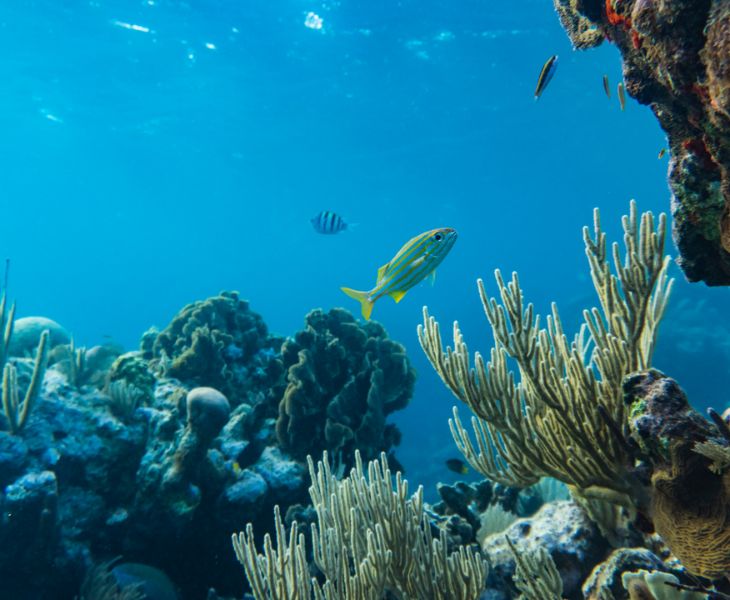It’s no surprise that Earth is known as the Blue Planet. About 70 percent of its surface is covered in water, and the oceans hold about 96% of all Earth’s water. It’s kind of amazing that Australia has the world’s third-largest ocean territory, spanning three oceans and occupying approximately 12 million square kilometers. The marine environment of Australia is home to 4000 different fish species, 500 coral species in the northern reefs, 50 distinct types of marine mammals, and a diverse spectrum of seabirds. It is believed that up to 80 percent of marine species found in southern Australian seas are found nowhere else on the planet.
Tuesday, 8th June is World Ocean Day recognised by the United Nations General Assembly in 2008. A global event to promote ocean health and environmental awareness and a time to recognise the intrinsic value of all the world’s oceans. World Ocean Day aims to increase awareness of our relationship with the ocean and encourage action to protect it. This year’s theme is Revitalization: Collective Action for the Ocean, which aims to put focus on the communities, ideas, and solutions that are working together to conserve and revitalise the ocean and everything it sustains.
For many years, reducing single-use material, such as plastic bags and bottles, has become a major theme for World Ocean Day. And, as the challenges the ocean faces continue to grow, the need for solutions is real. As the environmental issues attract more national coverage, we must engage and educate everyone on ocean-related environmental concerns.
This year let’s celebrate the World’s Oceans by learning some cool facts about them, and how they support humanity as well as all other organisms on the planet.
- The ocean is the world’s most potent force as it produces 70 percent of the oxygen that we breathe
- There are 38,000 distinct types of microbial species in a litre of saltwater
- The Mid-Water Ridge, Earth’s longest mountain range, lies beneath the ocean and stretches over 65,000 kilometres
- The Mariana Trench is the deepest point of the Earth’s ocean, measuring 11 kilometres and only 3 people have made it there because of the harsh conditions
- According to research, life started in the ocean around 3.5 million years ago. Many of the planet’s dominant forms of life live in the ocean. In reality, aquatic life makes up over 94 percent of all life on the planet
- The water at the ocean’s bottom coming out from hydrothermal vents can reach up to 400º Celsius (750º Fahrenheit), which is extremely hot and can crush you
- The Great Barrier Reef, with a length of around 2,000 kilometers is the world’s largest living structure that can be seen from space
- Coral reefs cover less than 0.5 percent of the ocean’s surface, but they support 90 percent of all aquatic species. Coral reefs are critical for marine species, but 60 percent of them are at risk of extinction in the next three decades
- The ocean is constantly in motion. We know this for sure because 29,000 rubber ducks went missing at sea in 1992 and they are still being discovered 20 years later
- According to National Geographic, the ocean contains more historical artefacts than all of the world’s history museums combined. Around 3 million shipwrecks, as well as all the artefacts associated with the RMS Titanic, the Spanish Armada, and Santa Maria (Christopher Columbus)
- Only one-fifth of the Earth’s ocean floor is mapped, which stands at 19 percent. That means we have got another 81 percent of the oceans still to survey, still to map. That’s an area about twice the size of Mars
- Amazingly, there’s an estimated 20 million tonnes of gold in the world’s oceans. 20 million tonnes of gold seems like a lot, but it only amounts to 0.004 parts per billion when distributed across the oceans. To extract a single ounce of gold we’d have to process 30 million pounds of ocean water
How you can help…
This World Oceans Day, you can get involved by asking our world leaders to protect 30% of our blue planet by 2030, sign the petition here. More than 90 countries have already committed to protecting at least 30% of their land and ocean by 2030. The World Ocean Day website has a huge range of social media resources available to help you get involved on your social media platforms too. Don’t forget to tag #WorldOceanDay #Protect30x30 and #OceanClimateAction

